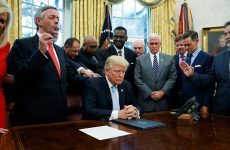America is still a “Christian nation,” if the term simply means a majority of the population will claim the label when a pollster calls. But, as a new Pew Research report unsparingly explains, the decline of Christianity in the United States “continues at a rapid pace.” A bare 65 percent of Americans now say they’re Christians, down from 78 percent as recently as 2007. The deconverted are mostly moving away from religion altogether, and the ranks of the religiously unaffiliated — the “nones” — have swelled from 16 to 26 percent over the same period. If this rate of change continues, the U.S. will be majority non-Christian by about 2035, with the nones representing well over one third of the population.
Smaller details from the study are equally striking. Protestantism lost its narrow claim to an outright majority of Americans’ souls around 2012. While older generations remain at least two-thirds Christian, millennials have an even 49-49 split of Christians vs. nones (40 percent) and those of other faiths (9 percent). Religious service attendance rates haven’t dramatically declined in the last decade, but they will soon if generational trends hold.
As even the strictest practitioners of laïcité must concede, major religious shifts like this will have equally major political effects — but we are in somewhat uncharted territory as to what those effects may be. In broad strokes, this decline keeps the U.S. trailing Western Europe’s religious and political evolution: the end of Christianity as a default faith and a move toward left/right politics that can be roughly characterized as socialism against nationalist populism. Yet Europe can hardly provide a clear window to our future, not least because many European states have both multi-party parliamentary systems and state churches.
So what, then, should we expect of an increasingly post-Christian American politics? I have a few ideas.
For Christians
In what remains of the American church, reactions to this decline will vary. Some will see it as a positive apocalypse, which is to say a revealing of what was always true. America was never really a Christian nation. Our government and society have long made choices and embraced values that are difficult, if not impossible, to square with Christianity, so an end of any association between the two is welcome. Likewise, the proportion of Americans who actually practiced Christian faith in any meaningful, life-altering sense was always substantially lower than the proportion who would identify as Christian in a poll. What we’re seeing is less mass deconversion than a belated honesty which may be an opportunity for new faithfulness, repentance, or even revival.
Other Christians, especially on the political right, will respond to this shift with sadness, alarm, or outright fear. And this is not mere selfishness, mere worry over loss of political or cultural power — though certainly that is a factor for some. But if you believe, as people of faith generally do, that your religion communicates a necessary truth about God, the universe, humanity, the purpose of life and how we should live it — well, then a precipitous decline in that religion is an inherently horrible thing with eternal implications for millions.
Still other Christians (and I count myself among them) will land somewhere in between these two views. Yet all across this spectrum of responses, I suspect, we’ll see an increasing concern for religious liberty as an ever-smaller portion of the broader public has a personal stake in its preservation as a special right distinct from freedoms of speech, association, and so on.
Dumping fuel on this fire are proposals from the post-religious left — Pew’s data shows religion is especially on decline among white Democrats — like Democratic candidate Beto O’Rourke’s plan to revoke tax exemptions for religious institutions that don’t affirm gay marriage. As O’Rourke’s fellow candidate South Bend Mayor Pete Buttigieg commented, “I’m not sure he understood the implications of what he was saying.” That includes the panic the idea induces among traditionally religious people who are already feeling isolated, caricatured, misunderstood by their country’s cultural mainstream. (For more on that panic, see this helpful explainer from Vox‘s Jane Coaston.)
For nones
For religiously unaffiliated Americans, the political consequences of declining Christianity feel more difficult to predict, because this group is legitimately a new phenomenon. That is not to say there has never been a mass movement away from religion in a relatively modern, Western, democratic context — see revolutionary France, for example, or, again, most of Western Europe. But there has never been anything like this in America, and you don’t have to take a big swig of the American exceptionalism Kool-Aid to concede our country is in many ways unique. Moreover, there is a substantial difference between the humdrum religious apathy or vague spirituality of a none as compared to the murderous anti-Catholicism of a French revolutionary. In fact, that lack of specific opposition is key here: Many nones aren’t consciously deconverting out of atheistic fervor. They’re not rebelling against Christendom but growing up entirely in its aftermath. That is what makes this situation unprecedented.
This caveat aside, I’d suggest the lack of a state church (which persists in nations as irreligious as Iceland, Sweden, Scotland, and the like) in America means religious efforts to obtain or keep political power will strike the unaffiliated rather differently here. No established religion means religious political action feels less like a tiresome anachronism — outdated and unnecessary, but nice for Grandma — and more like a threat of theocracy. In Europe, the state church already has a certain territory staked out as part of an ancient status quo. Here, every bit of territory is up for grabs, so the fight is always on.
Yet as contradictory as it may seem, I’ll also suggest left-wing nones may come to find they miss the religious right when grappling with its successor. The New York Times‘ Ross Douthat has argued the post-religious right of which President Trump has given us a glimpse will be an ugly beast indeed. Polling shows the “churchgoers who ultimately voted for Trump over Clinton still tend to hold different views than his more secular supporters,” he wrote last year, including being “less authoritarian and tribal on race and identity. …The trend was consistent: The more often a Trump voter attended church, the less white-identitarian they appeared, the more they expressed favorable views of racial minorities, and the less they agreed with populist arguments on trade and immigration.” In other words, on the right, the decline of Christianity looks to mean the rise of racism, as the communal life of active faith is replaced by darker impulses.
For all
Finally, for Americans of any religious affiliation or none at all, the decline of Christianity will make political communication more difficult. For centuries the Christian faith has indelibly shaped the English vocabulary — it is no exaggeration to say the King James Bible specifically is unparalleled in its cultural influence. That’s especially so with politics, which beside religion is the most common context in which we discuss the world as it is and as it should be.
The ways of thinking and turns of phrase that Christendom once made normative in America will become newly strange as Christianity declines. Those of us who remain religious will have to thoroughly rethink our assumptions about other Americans’ frames of reference. I am regularly reminded of this by revealing expressions of religious ignorance by my fellow journalists, the archetypal example of which is an Associated Press headline which announced, after the famous cathedral burned, that “Tourist mecca Notre Dame [is] also revered as [a] place of worship.” (For the AP writers, if no one else, “mecca” is a metaphor from Islam, and Notre Dame was a place of worship for centuries before the concept of tourism emerged. I read this headline to religious friends to peals of rueful laughter.)
Perhaps, whether you are among the nones or not, you think moving toward a more secular shared vocabulary is a good thing. But even if you’re right, the transition will be no less challenging. In an era of social fracture, loss of common language patterns can only exacerbate our disintegration. We have always talked against each other in politics; now we are talking past each other, too. As the decline of Christianity in the United States “continues at a rapid pace,” it will influence every level of our fractious project of self-governance, down to our very words.


